人教版(新课程标准)必修五Unit 5 First Aid单元复习课件 (45张ppt)
文档属性
| 名称 | 人教版(新课程标准)必修五Unit 5 First Aid单元复习课件 (45张ppt) | 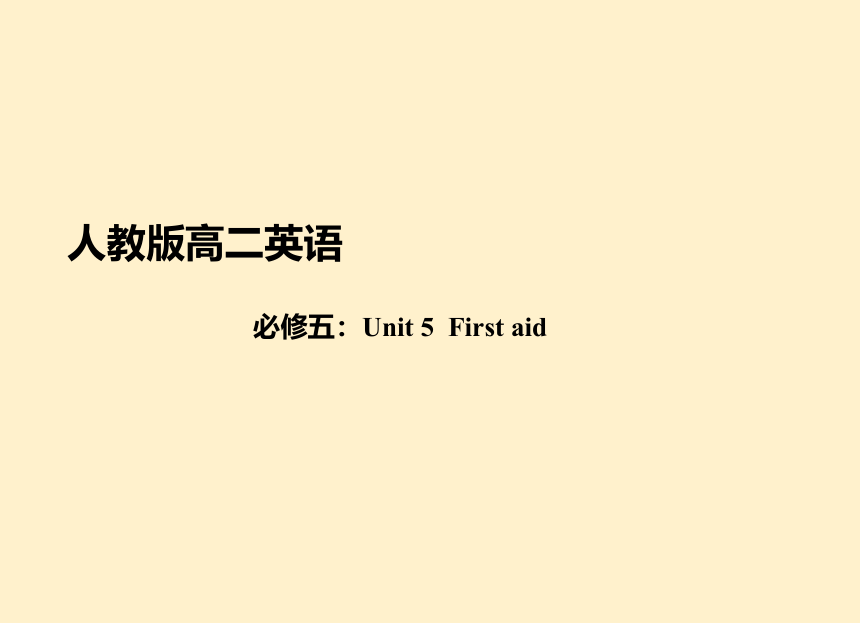 | |
| 格式 | zip | ||
| 文件大小 | 2.4MB | ||
| 资源类型 | 教案 | ||
| 版本资源 | 人教版(新课程标准) | ||
| 科目 | 英语 | ||
| 更新时间 | 2021-11-18 13:45:20 | ||
图片预览

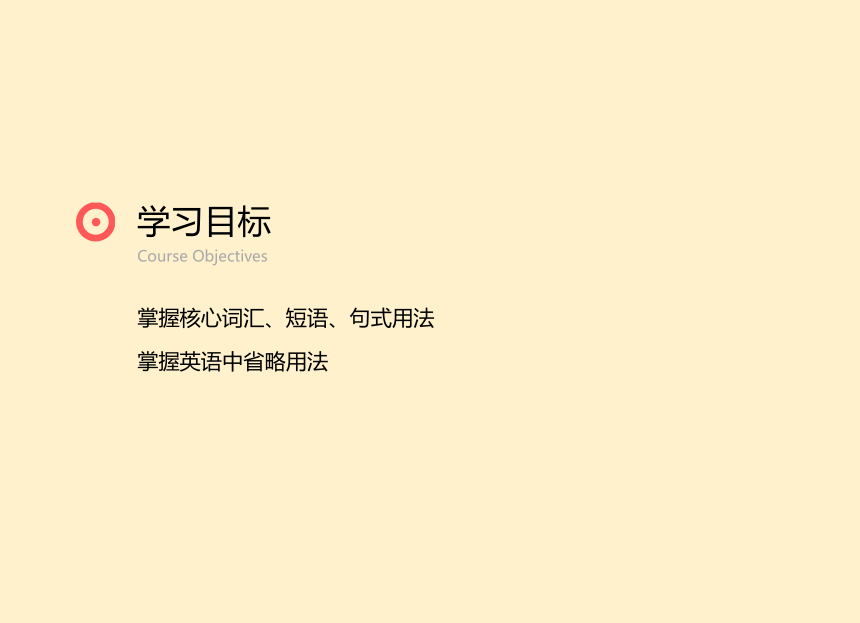
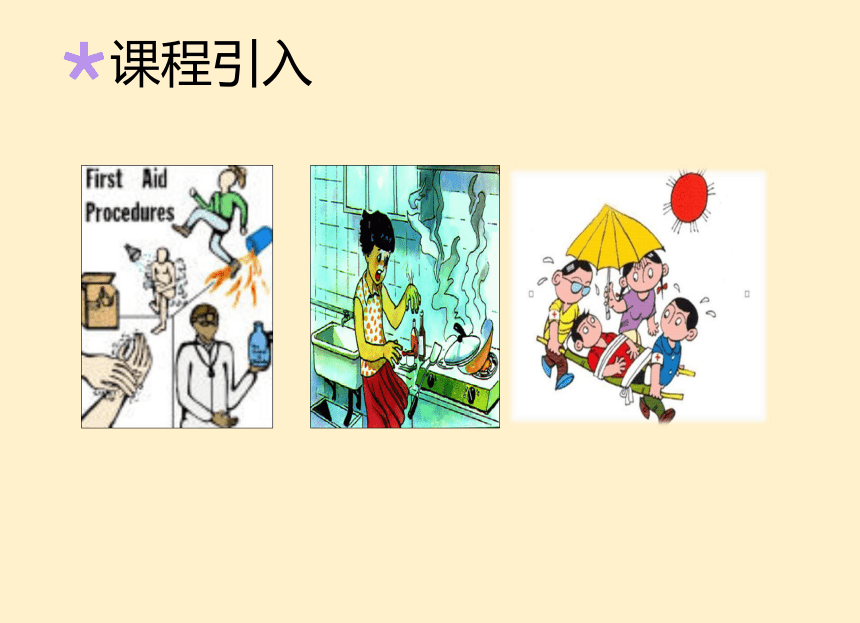
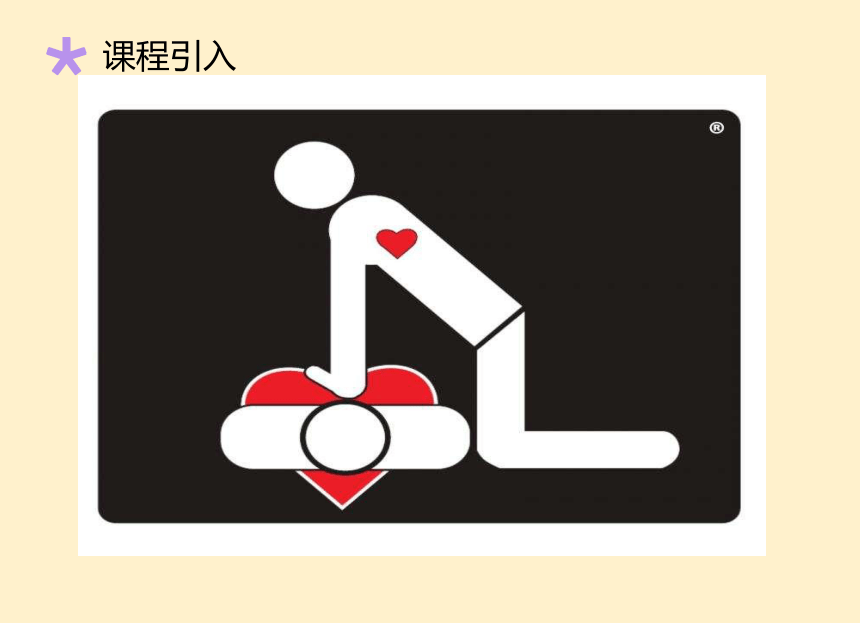
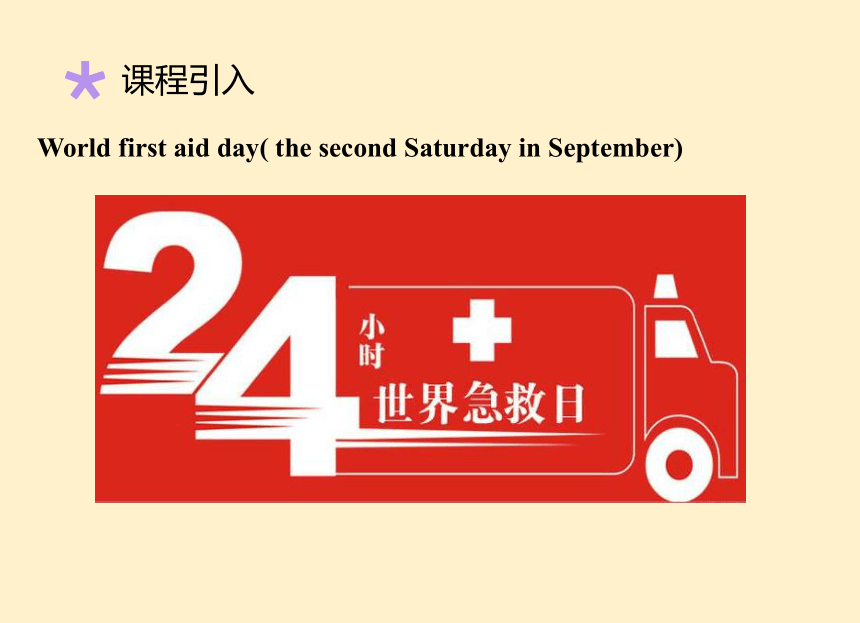
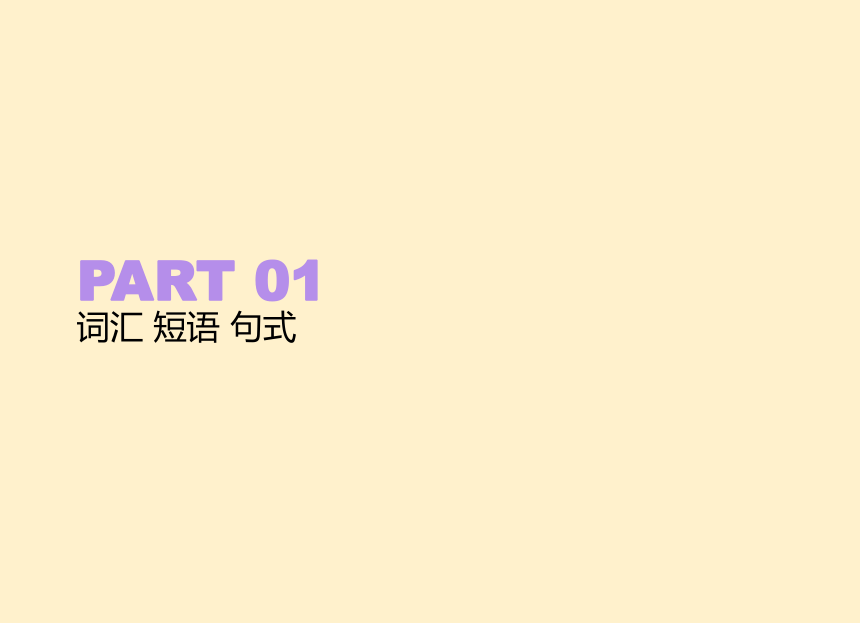

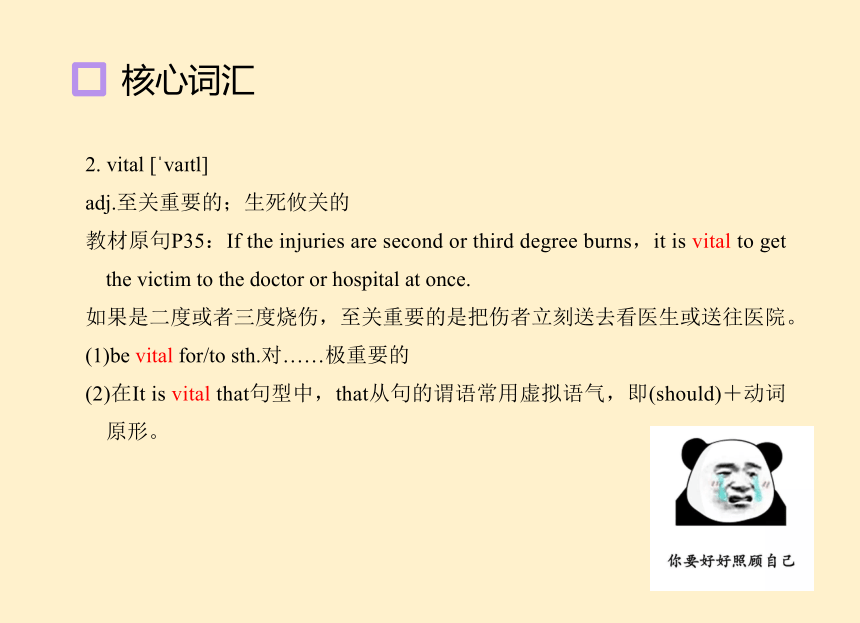
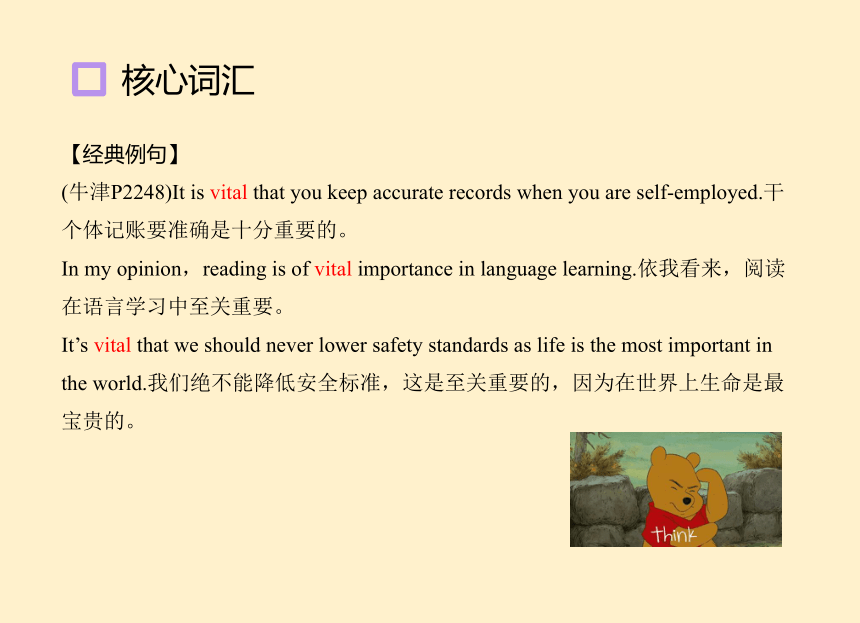
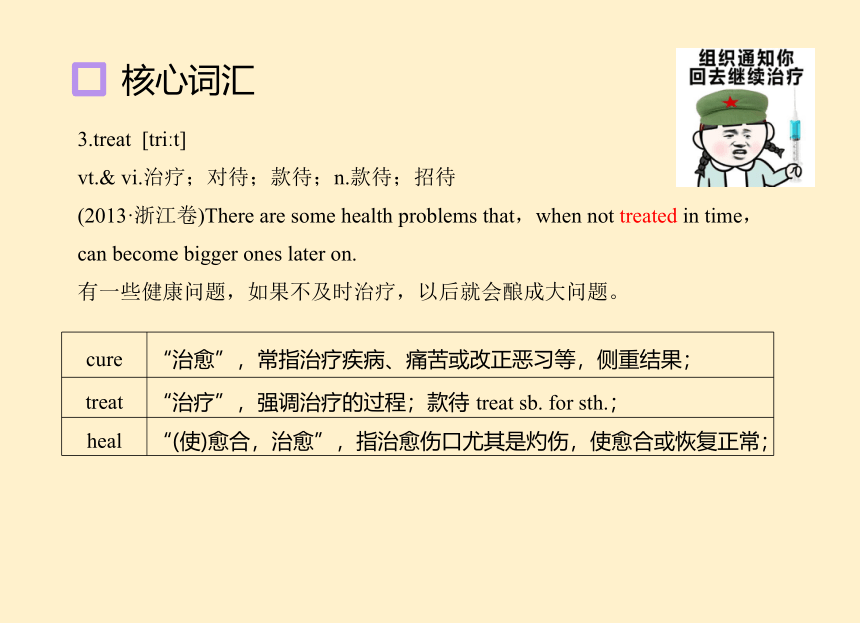
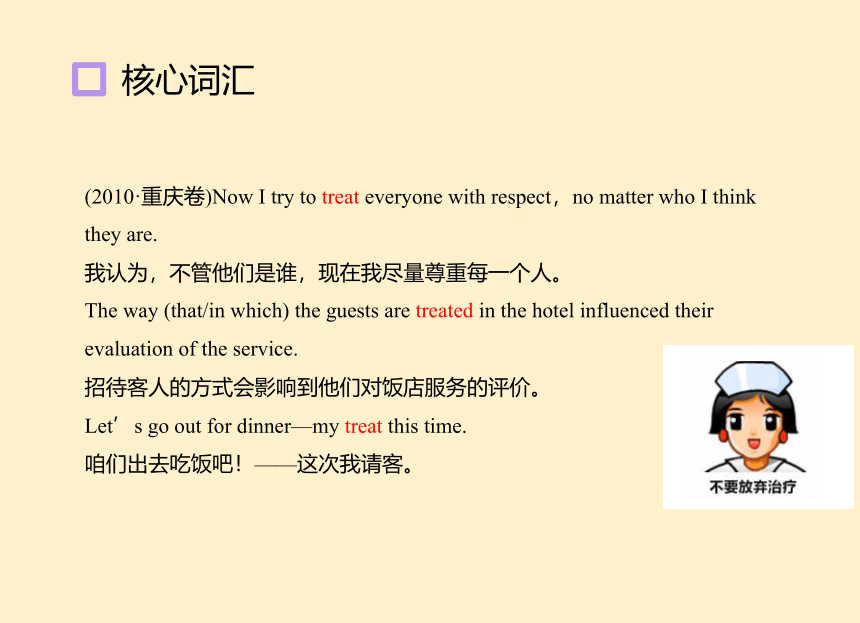
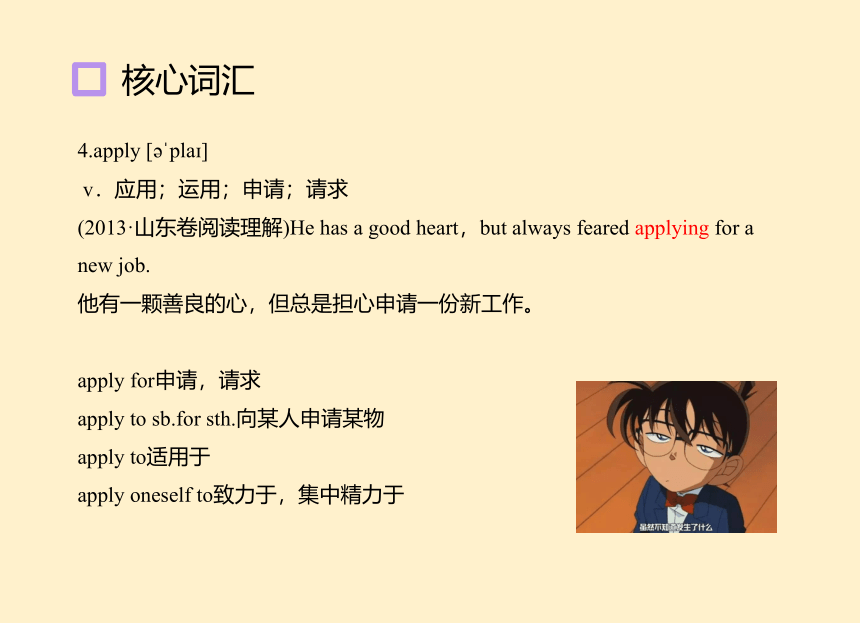
文档简介
(共45张PPT)
人教版高二英语
必修五:Unit 5 First aid
学习目标
Course Objectives
掌握核心词汇、短语、句式用法
掌握英语中省略用法
课程引入
课程引入
课程引入
World first aid day( the second Saturday in September)
PART 01
词汇 短语 句式
核心词汇
1.aid [e d]
n.& vt.帮助,援助;资助
I didn’t speak any French,but a nice man came to my aid and told me where to go.
Teachers give their lessons with the aid of computers.
He raised money in aid of the sick.
核心词汇
2. vital [ va tl]
adj.至关重要的;生死攸关的
教材原句P35:If the injuries are second or third degree burns,it is vital to get the victim to the doctor or hospital at once.
如果是二度或者三度烧伤,至关重要的是把伤者立刻送去看医生或送往医院。
(1)be vital for/to sth.对……极重要的
(2)在It is vital that句型中,that从句的谓语常用虚拟语气,即(should)+动词原形。
核心词汇
【经典例句】
(牛津P2248)It is vital that you keep accurate records when you are self employed.干个体记账要准确是十分重要的。
In my opinion,reading is of vital importance in language learning.依我看来,阅读在语言学习中至关重要。
It’s vital that we should never lower safety standards as life is the most important in the world.我们绝不能降低安全标准,这是至关重要的,因为在世界上生命是最宝贵的。
核心词汇
3.treat [tri t]
vt.& vi.治疗;对待;款待;n.款待;招待
(2013·浙江卷)There are some health problems that,when not treated in time,can become bigger ones later on.
有一些健康问题,如果不及时治疗,以后就会酿成大问题。
cure “治愈”,常指治疗疾病、痛苦或改正恶习等,侧重结果;
treat “治疗”,强调治疗的过程;款待 treat sb. for sth.;
heal “(使)愈合,治愈”,指治愈伤口尤其是灼伤,使愈合或恢复正常;
核心词汇
(2010·重庆卷)Now I try to treat everyone with respect,no matter who I think they are.
我认为,不管他们是谁,现在我尽量尊重每一个人。
The way (that/in which) the guests are treated in the hotel influenced their evaluation of the service.
招待客人的方式会影响到他们对饭店服务的评价。
Let’s go out for dinner—my treat this time.
咱们出去吃饭吧!——这次我请客。
核心词汇
4.apply [ pla ]
v.应用;运用;申请;请求
(2013·山东卷阅读理解)He has a good heart,but always feared applying for a new job.
他有一颗善良的心,但总是担心申请一份新工作。
apply for申请,请求
apply to sb.for sth.向某人申请某物
apply to适用于
apply oneself to致力于,集中精力于
核心词汇
Please clean the wound with a clean cloth and then apply the medicine to it.
(2016·重庆书面表达)In order to increase people’s awareness of protecting polar bears,I apply for the spokesman for polar bears sincerely.
It’s vital that the theory (should) be applied to practice,or it could just be something useless.
The old man manages to enrich his own cultural life,applying himself to learning English.
核心短语
1. in place 在适当的位置;适当
(牛津P1507)All the arrangements are now in place for their visit.他们来访的一切都安排就绪了。
out of place不适当的
in one’s place处在某人的位置上
take the place of sb.=take one’s place代替某人的位置
核心短语
Don’t take anything away.Father likes everything to be in place.不要拿走任何东西,父亲喜欢所有的东西都井井有条。
Being poor,he felt completely out of place among those rich people.他出生贫寒,处在富人圈中让他感到很不适宜。
If I had been in your place,I might have accepted the invitation.我要是处在你的位置,我可能接受了这份邀请。
核心短语
2.make a difference区别对待;有影响;起(重要)作用
教材原句P38:It shows that a knowledge of first aid can make a real difference.这说明了急救知识的确能发挥重要的作用。
(1)make no difference (to sb./sth.)
对某人/物没有作用或影响,对某人/物不重要
make some difference (to sb./sth.)
对某人/物有些作用或影响
(2)tell the difference 分辨,区分,区别
核心短语
It isn’t what you have done but what you will do that makes a difference.
重要的不是你做了什么而是你将要做什么。
(牛津P553)Your age shouldn’t make any difference to whether you get the job or not.
你能否得到这个工作与年龄无关。
Believe it or not,it makes no difference to me what you say.
信不信由你,你说什么对我没关系。
句式突破
1.John was presented with his award at a ceremony which recognized the bravery of ten people who had saved the life of another.
present sb with sth = present sth to sb
授予/赠给某人某物
He present a silver cup to the winner.
他把银杯颁给了获胜者。
句式突破
2.John was studying in his room when he heard screaming.约翰正在房间里学习,突然听到一声尖叫。
when在此作并列连词用,意为“正在这时;那时”。
be doing...when...正在……这时……
be about to do...when...正打算做……这时……
be just going to do...when...正要……这时……
be on the point of doing...when...正要……这时……
had just done...when刚……就在这时……
句式突破
We were discussing the problem when there was a power failure.我们正在讨论那个问题,这时停电了。
I was about to go out when the telephone rang.
我正打算出去,这时电话响了。
The professor had just finished his speech when students rushed out of the classroom.
教授刚结束了演讲,学生们冲出了教室。
句式突破
3.every time+句子 ,“每当······时”
【课文原句】
So many thousands of terrified people died every time there was an outbreak.每次暴发霍乱时,都有大批惊恐的老百姓病死。
every time为名词词组,引导时间状语从句,相当于whenever,表示“每当……时”。
名词词组作连词用,引导时间状语从句的还有:
(1)由time构成的名词词组:each time,the first/last time,next time,any time等。
(2)the+瞬间名词:the minute/instant/second/moment等。
综合练习
用所给词的适当形式填空
1.The group tried to put ________ (press) on the government to act.
2.The driver of the car received serious ________ (injure) to the legs and arms.
3.This gas is highly ________ (poison).
4.The expert has a language barrier in attending such an important meeting, but he should be praised for his ________ (brave).
5.The operation is very complex; besides, the long time needed is ________(bear).
综合练习
6.We need some bandages and a pair of ________ (scissor) to deal with the simple operation.
7.He was ________ (mild) surprised at the news.
8.The passengers ________ (tight) packed in the train.
9.There are various ________ (treat) available for this condition.
10.Modern day horse breeds come in a wide ________ (various) of shapes and sizes.
答案:
1.pressure 2.injuries 3.poisonous 4.bravery
5.unbearable 6.scissors 7.mildly 8.tightly
9.treatments 10.variety
PART 02
语法 Grammar
Warming up
Often the illness or injury is not serious, but there are other times when (the illness or injury is serious and ) giving first aid quickly can save lives.
Burns are called first (degree burns), second (degree burns) or third degree burns …
These affect both the top (layer of the skin) and the second layer of the skin.
省略(Ellipsis)
为了避免重复,省略句中的一个或几个成分,这种语法现象称为“省略”。省略是为了避免重复、突出新信息并使上下文紧密连接的一种语法修辞手段。省略在语言中,尤其在对话中,是一种十分普遍的现象。
一.简单句中的省略
1、省略主语 祈使句中主语通常省略;其它省略主语多限于少数现成的说法。
(1) ( I ) Thank you for your help.
(2) ( I ) See you later.
(3) ( It ) Doesn’t matter.
(4) ( I ) Beg your pardon.
2.省略主谓或主谓语的一部分
(1) (There is) No parking .
(2) (Is there) Anything wrong
(3) (Will you) Have a smoke
(4) What/How (do you think) about a cup of tea
(5) Why (do you) not say sorry to him
3.省略作宾语的不定式短语,只保留to,但如果不定式to后是be或完成时态,则须保留be或have:
–Are you going there
--Yes, I’d like to (go there).
(2) He didn’t give me the chance, though he had promised to (give me the chance).
(3) –Are you a doctor
--No, but I want to be.
4.省略表语
(1) –Are you thirsty --Yes, I am (thirsty).
(2) His brother isn’t lazy, nor is his sister (lazy).
5.同时省略几个成分
(1) Let’s meet at the same place as (we met) yesterday.
(2) –-Have you finished your work
---(I have) Not (finished my work) yet.
二、主从复合句中的省略
1、主句中有一些成分被省略
(1) ( I’m ) Sorry to hear that your mother is ill.
(2) ( It’s a ) Pity that he missed the bus.
2、not, so常用来替代从句。
(1) –Is he coming back tonight --I think so.
(2) –She must be busy now --If so, she can’t go with us.
(3) –Is she feeling better --I’m afraid not.
(4) –Do you think he will attend the meeting --I guess not.
so常用于替代肯定形式的从句,而not常用来替代否定形式的从句。常见的动词有:think、imagine、guess、say、hope、fear等。
这种用法常见的有:How so Why so
3、连词的that省略
宾语从句中常省略连词that,但也有不能省略的情况。
I think (that) you are right.
(2) 在定语从句中,that在从句中作宾语时可省略.
I don’t know the place (that) he mentioned in his last letter.
4、在某些状语从句中,从句的主语与主句的主语一致时,可省去“主语+be”部分
When (he was) still a boy of 10, he had to work day and night.
She tried her best though (she was) rather poor in health.
If (you are) asked you may come in.
If (it is) necessary I’ll explain to you again.
三. 并列句中的省略
两个并列句中,后一个分句常省略与前一分句中相同的部分。
(1) My father is a doctor and my mother (is) a nurse.
(2) I study at college and my sister (studies) at high school.
(3) When summer comes, the day is getting longer and longer, and the night (is getting) shorter and shorter.
其他省略
1、不定式符号to的省略
并列的不定式可省去后面的 to.
I told him to sit down and wait for a moment.
(2) help 当“帮助”讲时,后面的宾语或宾补的不定式符号to可带可不带.
I will help (to) do it for you.
(3) 介词but前若有动词do,后面的不定式不带 to.
The boy did nothing but cry.
(4) 某些使役动词(let, make, have)及感官动词(see, watch, hear, notice, observe, feel, look at, listen to等)后面作宾语补足语的不定式一定要省去 to, 但在被动语态中须将to 复原。
I saw the boy fall off the tree.
The boy was seen to fall off the tree.
The boss made us work 12 hours a day.
We were made to work 12 hours a day.
(5) 主语从句中有动词do,后面作表语的不定式的 to可带可不带。
All we can do now is (to) wait.
What we can do now is (to) wait.
(6) find 当“发现”讲时,后面作宾语补足语的不定式符号to可带可不带。
We found him (to) work very hard at the experiment.
但如果是不定式 to be,则不能省略。
She found him to be dishonest.
2、连词if在部分虚拟条件句中可省略,但后面的语序有变化。
(1) Had they time, they would certainly come and help us.
(2) Were I you, I would do the work better.
(3)Should there be a flood, what should we do
3、主句和从句各有一些成分省略。
The sooner (you do it), the better (it will be).
(Where there is ) No pain , (there is ) no gain.
PART 03
综合练习
课文填空
The skin is the largest organ of your body, __1__ can protect __2__ disease, poisons and so on. It has complex functions. But when your skin gets __3__(burn) it can be very serious, so it is very important to know first aid for burns. A __4__ (various) of things can burn your skin, and there are three types of burns. If you've got burns, first, remove clothing __5__ (use) scissors if necessary. For first degree burns, place cool, clean, wet cloths on them. For second degree burns, keep cloths cool by putting them back in a basin of cold water, squeezing them __6__ and placing them on the burned area over and over __7__ for about an hour. Next, dry the burned area __8__ (gentle), then cover the burned area with a dry, clean bandage without sticking __9__ the skin, and hold it __10__ place with tape. If you've got second or third degree burns, you'd better go to hospital at once.
答案
1.which 2.against 3.burned/burnt 4.variety 5.using 6.out 7.again 8.gently 9.to 10.in
课堂总结
词汇
帮助
至关重要的
治疗
申请
短语 in place make a difference
句式 1.present sb with sth = present sth to sb
2.be doing...when...正在……这时……
be about to do...when...正打算做……这时……
3.every time +句子
语法 省略
词汇
帮助 aid
至关重要的 vital
治疗 treat
申请 apply
短语 in place 在适当位置 make a difference 区别对待
句式 1.present sb with sth = present sth to sb
2.be doing...when...正在……这时……
be about to do...when...正打算做……这时……
3.every time +句子
语法 省略
人教版高二英语
必修五:Unit 5 First aid
学习目标
Course Objectives
掌握核心词汇、短语、句式用法
掌握英语中省略用法
课程引入
课程引入
课程引入
World first aid day( the second Saturday in September)
PART 01
词汇 短语 句式
核心词汇
1.aid [e d]
n.& vt.帮助,援助;资助
I didn’t speak any French,but a nice man came to my aid and told me where to go.
Teachers give their lessons with the aid of computers.
He raised money in aid of the sick.
核心词汇
2. vital [ va tl]
adj.至关重要的;生死攸关的
教材原句P35:If the injuries are second or third degree burns,it is vital to get the victim to the doctor or hospital at once.
如果是二度或者三度烧伤,至关重要的是把伤者立刻送去看医生或送往医院。
(1)be vital for/to sth.对……极重要的
(2)在It is vital that句型中,that从句的谓语常用虚拟语气,即(should)+动词原形。
核心词汇
【经典例句】
(牛津P2248)It is vital that you keep accurate records when you are self employed.干个体记账要准确是十分重要的。
In my opinion,reading is of vital importance in language learning.依我看来,阅读在语言学习中至关重要。
It’s vital that we should never lower safety standards as life is the most important in the world.我们绝不能降低安全标准,这是至关重要的,因为在世界上生命是最宝贵的。
核心词汇
3.treat [tri t]
vt.& vi.治疗;对待;款待;n.款待;招待
(2013·浙江卷)There are some health problems that,when not treated in time,can become bigger ones later on.
有一些健康问题,如果不及时治疗,以后就会酿成大问题。
cure “治愈”,常指治疗疾病、痛苦或改正恶习等,侧重结果;
treat “治疗”,强调治疗的过程;款待 treat sb. for sth.;
heal “(使)愈合,治愈”,指治愈伤口尤其是灼伤,使愈合或恢复正常;
核心词汇
(2010·重庆卷)Now I try to treat everyone with respect,no matter who I think they are.
我认为,不管他们是谁,现在我尽量尊重每一个人。
The way (that/in which) the guests are treated in the hotel influenced their evaluation of the service.
招待客人的方式会影响到他们对饭店服务的评价。
Let’s go out for dinner—my treat this time.
咱们出去吃饭吧!——这次我请客。
核心词汇
4.apply [ pla ]
v.应用;运用;申请;请求
(2013·山东卷阅读理解)He has a good heart,but always feared applying for a new job.
他有一颗善良的心,但总是担心申请一份新工作。
apply for申请,请求
apply to sb.for sth.向某人申请某物
apply to适用于
apply oneself to致力于,集中精力于
核心词汇
Please clean the wound with a clean cloth and then apply the medicine to it.
(2016·重庆书面表达)In order to increase people’s awareness of protecting polar bears,I apply for the spokesman for polar bears sincerely.
It’s vital that the theory (should) be applied to practice,or it could just be something useless.
The old man manages to enrich his own cultural life,applying himself to learning English.
核心短语
1. in place 在适当的位置;适当
(牛津P1507)All the arrangements are now in place for their visit.他们来访的一切都安排就绪了。
out of place不适当的
in one’s place处在某人的位置上
take the place of sb.=take one’s place代替某人的位置
核心短语
Don’t take anything away.Father likes everything to be in place.不要拿走任何东西,父亲喜欢所有的东西都井井有条。
Being poor,he felt completely out of place among those rich people.他出生贫寒,处在富人圈中让他感到很不适宜。
If I had been in your place,I might have accepted the invitation.我要是处在你的位置,我可能接受了这份邀请。
核心短语
2.make a difference区别对待;有影响;起(重要)作用
教材原句P38:It shows that a knowledge of first aid can make a real difference.这说明了急救知识的确能发挥重要的作用。
(1)make no difference (to sb./sth.)
对某人/物没有作用或影响,对某人/物不重要
make some difference (to sb./sth.)
对某人/物有些作用或影响
(2)tell the difference 分辨,区分,区别
核心短语
It isn’t what you have done but what you will do that makes a difference.
重要的不是你做了什么而是你将要做什么。
(牛津P553)Your age shouldn’t make any difference to whether you get the job or not.
你能否得到这个工作与年龄无关。
Believe it or not,it makes no difference to me what you say.
信不信由你,你说什么对我没关系。
句式突破
1.John was presented with his award at a ceremony which recognized the bravery of ten people who had saved the life of another.
present sb with sth = present sth to sb
授予/赠给某人某物
He present a silver cup to the winner.
他把银杯颁给了获胜者。
句式突破
2.John was studying in his room when he heard screaming.约翰正在房间里学习,突然听到一声尖叫。
when在此作并列连词用,意为“正在这时;那时”。
be doing...when...正在……这时……
be about to do...when...正打算做……这时……
be just going to do...when...正要……这时……
be on the point of doing...when...正要……这时……
had just done...when刚……就在这时……
句式突破
We were discussing the problem when there was a power failure.我们正在讨论那个问题,这时停电了。
I was about to go out when the telephone rang.
我正打算出去,这时电话响了。
The professor had just finished his speech when students rushed out of the classroom.
教授刚结束了演讲,学生们冲出了教室。
句式突破
3.every time+句子 ,“每当······时”
【课文原句】
So many thousands of terrified people died every time there was an outbreak.每次暴发霍乱时,都有大批惊恐的老百姓病死。
every time为名词词组,引导时间状语从句,相当于whenever,表示“每当……时”。
名词词组作连词用,引导时间状语从句的还有:
(1)由time构成的名词词组:each time,the first/last time,next time,any time等。
(2)the+瞬间名词:the minute/instant/second/moment等。
综合练习
用所给词的适当形式填空
1.The group tried to put ________ (press) on the government to act.
2.The driver of the car received serious ________ (injure) to the legs and arms.
3.This gas is highly ________ (poison).
4.The expert has a language barrier in attending such an important meeting, but he should be praised for his ________ (brave).
5.The operation is very complex; besides, the long time needed is ________(bear).
综合练习
6.We need some bandages and a pair of ________ (scissor) to deal with the simple operation.
7.He was ________ (mild) surprised at the news.
8.The passengers ________ (tight) packed in the train.
9.There are various ________ (treat) available for this condition.
10.Modern day horse breeds come in a wide ________ (various) of shapes and sizes.
答案:
1.pressure 2.injuries 3.poisonous 4.bravery
5.unbearable 6.scissors 7.mildly 8.tightly
9.treatments 10.variety
PART 02
语法 Grammar
Warming up
Often the illness or injury is not serious, but there are other times when (the illness or injury is serious and ) giving first aid quickly can save lives.
Burns are called first (degree burns), second (degree burns) or third degree burns …
These affect both the top (layer of the skin) and the second layer of the skin.
省略(Ellipsis)
为了避免重复,省略句中的一个或几个成分,这种语法现象称为“省略”。省略是为了避免重复、突出新信息并使上下文紧密连接的一种语法修辞手段。省略在语言中,尤其在对话中,是一种十分普遍的现象。
一.简单句中的省略
1、省略主语 祈使句中主语通常省略;其它省略主语多限于少数现成的说法。
(1) ( I ) Thank you for your help.
(2) ( I ) See you later.
(3) ( It ) Doesn’t matter.
(4) ( I ) Beg your pardon.
2.省略主谓或主谓语的一部分
(1) (There is) No parking .
(2) (Is there) Anything wrong
(3) (Will you) Have a smoke
(4) What/How (do you think) about a cup of tea
(5) Why (do you) not say sorry to him
3.省略作宾语的不定式短语,只保留to,但如果不定式to后是be或完成时态,则须保留be或have:
–Are you going there
--Yes, I’d like to (go there).
(2) He didn’t give me the chance, though he had promised to (give me the chance).
(3) –Are you a doctor
--No, but I want to be.
4.省略表语
(1) –Are you thirsty --Yes, I am (thirsty).
(2) His brother isn’t lazy, nor is his sister (lazy).
5.同时省略几个成分
(1) Let’s meet at the same place as (we met) yesterday.
(2) –-Have you finished your work
---(I have) Not (finished my work) yet.
二、主从复合句中的省略
1、主句中有一些成分被省略
(1) ( I’m ) Sorry to hear that your mother is ill.
(2) ( It’s a ) Pity that he missed the bus.
2、not, so常用来替代从句。
(1) –Is he coming back tonight --I think so.
(2) –She must be busy now --If so, she can’t go with us.
(3) –Is she feeling better --I’m afraid not.
(4) –Do you think he will attend the meeting --I guess not.
so常用于替代肯定形式的从句,而not常用来替代否定形式的从句。常见的动词有:think、imagine、guess、say、hope、fear等。
这种用法常见的有:How so Why so
3、连词的that省略
宾语从句中常省略连词that,但也有不能省略的情况。
I think (that) you are right.
(2) 在定语从句中,that在从句中作宾语时可省略.
I don’t know the place (that) he mentioned in his last letter.
4、在某些状语从句中,从句的主语与主句的主语一致时,可省去“主语+be”部分
When (he was) still a boy of 10, he had to work day and night.
She tried her best though (she was) rather poor in health.
If (you are) asked you may come in.
If (it is) necessary I’ll explain to you again.
三. 并列句中的省略
两个并列句中,后一个分句常省略与前一分句中相同的部分。
(1) My father is a doctor and my mother (is) a nurse.
(2) I study at college and my sister (studies) at high school.
(3) When summer comes, the day is getting longer and longer, and the night (is getting) shorter and shorter.
其他省略
1、不定式符号to的省略
并列的不定式可省去后面的 to.
I told him to sit down and wait for a moment.
(2) help 当“帮助”讲时,后面的宾语或宾补的不定式符号to可带可不带.
I will help (to) do it for you.
(3) 介词but前若有动词do,后面的不定式不带 to.
The boy did nothing but cry.
(4) 某些使役动词(let, make, have)及感官动词(see, watch, hear, notice, observe, feel, look at, listen to等)后面作宾语补足语的不定式一定要省去 to, 但在被动语态中须将to 复原。
I saw the boy fall off the tree.
The boy was seen to fall off the tree.
The boss made us work 12 hours a day.
We were made to work 12 hours a day.
(5) 主语从句中有动词do,后面作表语的不定式的 to可带可不带。
All we can do now is (to) wait.
What we can do now is (to) wait.
(6) find 当“发现”讲时,后面作宾语补足语的不定式符号to可带可不带。
We found him (to) work very hard at the experiment.
但如果是不定式 to be,则不能省略。
She found him to be dishonest.
2、连词if在部分虚拟条件句中可省略,但后面的语序有变化。
(1) Had they time, they would certainly come and help us.
(2) Were I you, I would do the work better.
(3)Should there be a flood, what should we do
3、主句和从句各有一些成分省略。
The sooner (you do it), the better (it will be).
(Where there is ) No pain , (there is ) no gain.
PART 03
综合练习
课文填空
The skin is the largest organ of your body, __1__ can protect __2__ disease, poisons and so on. It has complex functions. But when your skin gets __3__(burn) it can be very serious, so it is very important to know first aid for burns. A __4__ (various) of things can burn your skin, and there are three types of burns. If you've got burns, first, remove clothing __5__ (use) scissors if necessary. For first degree burns, place cool, clean, wet cloths on them. For second degree burns, keep cloths cool by putting them back in a basin of cold water, squeezing them __6__ and placing them on the burned area over and over __7__ for about an hour. Next, dry the burned area __8__ (gentle), then cover the burned area with a dry, clean bandage without sticking __9__ the skin, and hold it __10__ place with tape. If you've got second or third degree burns, you'd better go to hospital at once.
答案
1.which 2.against 3.burned/burnt 4.variety 5.using 6.out 7.again 8.gently 9.to 10.in
课堂总结
词汇
帮助
至关重要的
治疗
申请
短语 in place make a difference
句式 1.present sb with sth = present sth to sb
2.be doing...when...正在……这时……
be about to do...when...正打算做……这时……
3.every time +句子
语法 省略
词汇
帮助 aid
至关重要的 vital
治疗 treat
申请 apply
短语 in place 在适当位置 make a difference 区别对待
句式 1.present sb with sth = present sth to sb
2.be doing...when...正在……这时……
be about to do...when...正打算做……这时……
3.every time +句子
语法 省略
